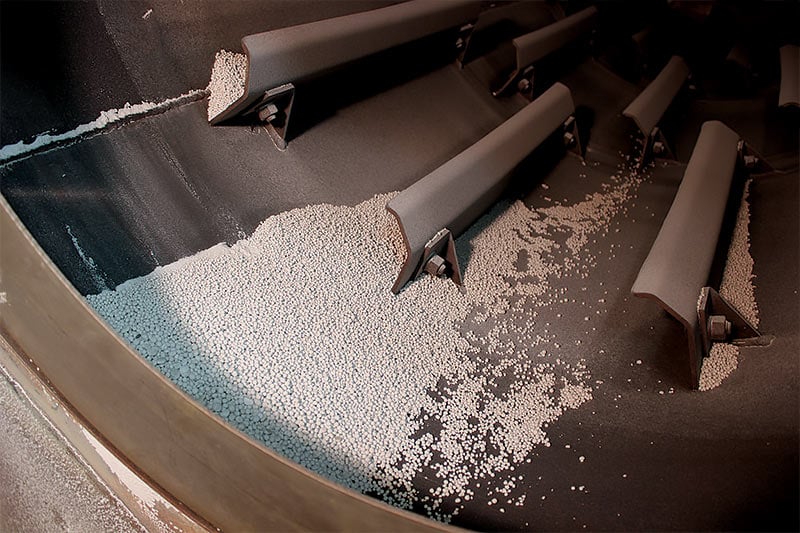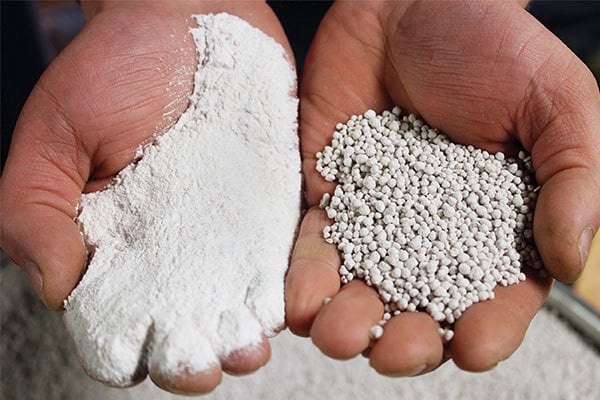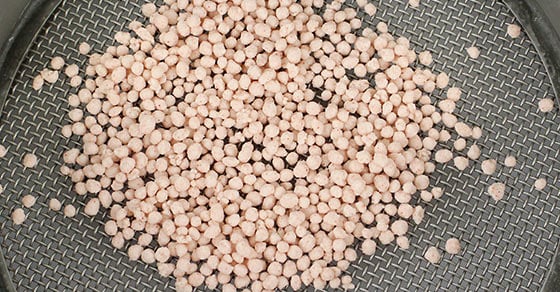As a leader in potash fertilizer production equipment and systems, we understand the vital role potassium-bearing fertilizers bring to the overall health and quality of plants. As it turns out, however, new research is revealing that potassium’s contribution to plant health is even more important than the industry initially thought; researchers are now finding that potassium also has a major influence on how plants tolerate stress.
This finding has prompted much excitement, as a solution is desperately needed at a time when biotic and abiotic stresses on plants continue to escalate. Some experts anticipate that potassium will be especially important in tolerance to drought – a growing concern amidst the uncertainties of climate change and dwindling water resources.
Potash Production for Use as a Nutrient Input
The term “potash” is used to describe salts that bear potassium. Originally, potash was produced via the burning of wood and leaching of the remaining ashes, hence the name pot ash.
Today, potash is principally mined from deposits created by the drying up of water bodies. Two factors in particular are critical to producing a quality potash product: drying and agglomeration.
Drying
Potash mining is typically carried out via a solution mining technique. As a result, upon extraction, the mineral requires drying in a rotary dryer. As a hygroscopic material (meaning it readily absorbs moisture from the air), keeping potash dry is important in reducing caking issues, and ensuring as little water content is transported as possible.

Potash in a rotary dryer during testing in the FEECO Innovation Center
Agglomeration
Dried potash can be used in its raw form, but offers much better performance as an agglomerate or granular product. Therefore, either compaction granulation or pelletizing via tumble-growth agglomeration (wet granulation) is used to process the fines into a more easily handled and applied granule. Cooling potash prior to storage or transport is also frequently performed, as it helps to enhance granule integrity and reduce issues during storage.

Potash before (left) and after (right) wet granulation/pelletizing
Alternative Sources of Potash Spur R&D
Although there is certainly no shortage of potash, the Southern hemisphere and in particular, developing regions, struggle to economically meet potassium input demands; while the northern hemisphere is rich in potash resources, shipping them to the southern hemisphere is costly, and opening new potash mines in the southern hemisphere is not economically feasible. Combined with the increasingly important role of potash, producers are exploring alternative sources of the material.
Potash is most commonly in the form of potassium chloride, or KCl, but a variety of other compounds and potassium-bearing minerals exist. Among them:
- Polyhalite
- Struvite
- Silicate rocks
- Langbeinite
- Leonite
- Granite dust
- Sulfate of Potash (SOP)
- Muriate of Potash (MOP)
- Kelp Meal
- Wood Ash
- Green Sand
- Potassium nitrate
Feldspar is also being researched as an alternative source of potassium at MIT’s Materials Research Laboratory.
The FEECO Innovation Center – a batch and pilot testing facility – has seen interest around these alternative sources in recent years. Producers are bringing unconventional materials to the facility and looking to create products that emulate the success of more traditional products by developing agglomeration and drying processes that produce a premium potash fertilizer product.

Potassium Sulfate (SOP) granules
Potash’s Role in Stress Tolerance
In recent years, the agriculture industry has seen increasing pressure to maximize yields in an effort to keep up with the food demands of the exponentially growing population. While efforts have largely centered around nutrient management, minimizing the effects that stress has on crops is also essential in securing future food security.
Stress can cause effects ranging from poor crop quality, to limited yields, and even a loss of crop, so minimizing its effects are paramount to maximizing yields.
As it turns out, research has uncovered that potassium could be a valuable tool in combating stress on plants, making potash – the potassium-bearing mineral – ever more important.
The Role of Potash in Tolerating Biotic Stress
Biotic stressors, or stress delivered by living organisms such as pests, fungus, disease and the like, are wreaking havoc on crop production, a fact exemplified by the increasing reliance on chemical pesticides.
One study on crop protection found that global potential loss for crops from biotic stressors varied from less than 50% (for barley) to more than 80% (for cotton and sugar beets). Weeds were the greatest threat, posing a potential loss of 32%.
Numerous studies have shown that an adequate supply of potassium in plants can contribute significantly to biotic stress resistance.
In 1990, the International Potash Institute of Bern/Switzerland conducted an extensive survey on the effects of potassium on plant health. The survey reviewed existing data on the topic and concluded that potassium may impact tolerance to biotic stress on many levels, including:
- Development, survival, and multiplication of pest/disease
- Severity of attack
- Establishment and spread of pest/disease
- The capability of the plant to repair and recover from biotic stress
Another study examined rice stem borers and found that when added in quantities of 50 or 60 kg/ha, potassium fertilizer significantly reduced the infestation rate of the rice borers and also resulted in an increased yield.
It is important to note that in some plants, or with certain stressors, an adequate supply of potassium can actually decrease stress tolerance. The IPI survey found that a beneficial effect was observed in 65% of cases, and a negative impact in 28% of cases, with negative responses most commonly related to nematodes and viruses.
The Role of Potash in Tolerating Abiotic Stress
Similarly, abiotic stress on crops has also been exacerbated in recent times as weather patterns change. Extreme temperatures, flooding, drought, and more, have become increasingly part of the ever-present agricultural struggle.
Potassium has been shown to promote tolerance of a wide variety of abiotic stressors. For example, the Potash Development Association (PDA) notes that potassium aids in frost tolerance because it increases the sugar content in plant cells, which reduces the potential for freezing.
According to the group, potassium also reduces the potential for lodging, or the bending of stalks, by increasing the strength and thickness of cell walls. Lodging reduces yield and can be caused by a number of different factors, including rain, wind and hail.
Drought Tolerance
Perhaps the most challenging abiotic stressors growers are likely to face are increasing aridity and drought conditions. It is well established that dry areas around the world are becoming more dry and are also expanding, resulting in a growing crisis of inadequate water resources for crops.
Drought is an especially devastating abiotic stressor, with the potential to prevent germination, damage overall crop health, and substantially reduce yields. It can also cause long-term damage to soil.
Potassium plays a key role in how a plant manages water and as such, is being examined for use in helping plants to tolerate drought conditions.
According to the Potash Development Association, potassium serves as the regulator for the opening and closing of stomata, which, among other things, controls the release of water vapor in plants. In times of water shortage, the plant stomata closes in order to conserve water. If the plant is deficient in potassium, however, the stomata cannot function as quickly, causing a loss of water vapor and potential for an increased susceptibility to drought.
In some cases, the addition of potash has even shown to be more beneficial than adding more water.
Potassium has also been shown to help water-logged cotton plants recover from flooding, exhibiting significant improvements. This same study also showed that the addition of potassium greatly improved the plants’ nutrient uptake abilities.
Conclusion
Potash has long been an essential tool in crop production, but recent research confirms that its role is even more critical than previously thought. Potash’s role in helping plants to tolerate biotic and abiotic stressors, particularly drought, is likely to be crucial in meeting future food security demands. Furthermore, the increasing importance of potash, combined with logistical challenges, has producers looking to bring less-traditional potash products to market, with research and development around these resources on the rise.
FEECO has been providing batch and pilot testing, custom agglomeration and drying equipment, and parts and service support to the potash industry since 1951. Our extensive experience around potash allows us to work with all forms of the nutrient – traditional and novel – to produce the best processing solution and equipment for the desired end product results. For more information on our potash capabilities, contact us today!



